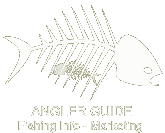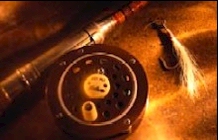VENTURA, Calif. - The
nine women meet monthly to discuss one of their favorite topics. They
exchange recipes, hold workshops and commiserate over the ones that got
away.
A local book club? A Tupperware party?
No. These women are members of the Gold Coast Lady
Anglers, a women's fishing club based in Ventura County, Calif.
Co-presidents Jacquelyn Appell and Jeanne Zappia met
on a charter boat in 1999 and realized they shared a passion for
fishing. Wanting to meet other women with the same interest, they formed
the club in the spring of 2001.
"We were just trying to get women together who enjoy a
hobby and the friendship of other women," said Zappia, a 48-year-old
chief financial officer and culinary student from Ventura.
The search for members, however, has proved to be a
bigger obstacle than anticipated. Despite posting numerous fliers at
local landings and tackle shops and informing people by word of mouth,
the club has remained at the nine-member high-water mark.
Appell, who grew up oceanfishing with her grandfather
in Long Island, N.Y., thinks the reason may stem from fishing being more
associated with males.
"It is not a woman's sport. I hate to say it. It is
dominated by males. It is just one of those sports that women aren't
into," said Appell, a 52-year-old speech pathologist from Westlake
Village, Calif. "Some women think it is awful to put bait on and take a
fish off the hook."
Zappia feels that some women may be intimidated by the
environment or are discouraged from attempting to fish.
"Maybe their husbands or boyfriends don't support it,"
said Zappia, who started oceanfishing in 1992. "For me, I think it would
be just the opposite, that you would want to share in a common
interest."
The Department of Fish and Game does not keep gender
statistics of fishing license purchases, but a 1996 study by the U.S.
Fish and Wildlife Services estimated that in California, 20 percent of
males fish and 5 percent of females.
Dave Wortham, captain of the Erna-B, estimates that he
has about 10 to 12 women per week on his boat. Wortham is hoping to see
that number increase.
"They (women) do a fine job. I'd like to see more of
them get into it," said Wortham, who has had Zappia and Appell on his
charters. "All of them have a good clue and they are not afraid to ask
questions if they don't know."
Although Zappia is generally well received by male
anglers, she has had a few negative encounters.
"Two years ago, I had a charter and I caught a
27-pound yellowtail and won the jackpot on the boat. The guy who was
second was really mad and said, 'I have to go home and tell my wife I
lost the jackpot to a broad.' That was irritating to me," said Zappia,
who sports custom-wrapped pink-and-black fishing rods. "But most time
the men are pretty supportive and fun to be with. I think some guys are
amazed at how much we know."
Appell has also been exposed to differential treatment
because of her gender.
"Sometimes on open party boats you get men who are
rough around the edges. You get some who apologize if they curse and
others who do it intentionally just to get a rise," said Appell. "But
the ones I have encountered for the most part are really nice people.
Some are very helpful and are really open with information that will
help you."
The club hopes to expand to the point where it can
charter a boat consisting of all female anglers (about 30). It also
wants enough members to be able to hold charity events, such as fishing
to feed needy families or raising money for underprivileged children.
Appell believes that fishing could become more popular
with women if they are able to shed the perpetuating stereotype that
women can't be feminine if they fish.
"It is a balance. I consider myself feminine," said
Appell, who never forgets to wear lipstick when she fishes. "I am not
grubby when I go fishing. I am wearing fishing boots and a pair of
jeans. I feel that there is a perception that if you like to fish you
must be a tomboy. But I am just a woman who likes to fish."


